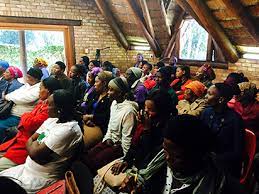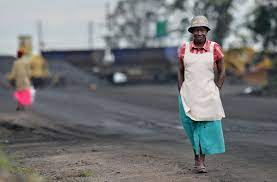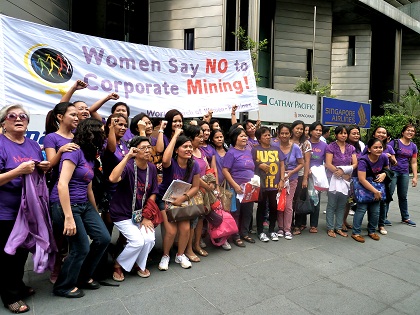
“We have been reduced to animals now. Our lives do not matter, that is why no one cares about our suffering over water,” says Mrs Nkhosi from Somkhele. “The water taps are mere decorations now, nothing ever comes out.” On August 12, women representing the communities of Somkhele and Fuleni gathered at a Women’s Water Assembly in Embonambi Kwa Zulu Natal. The Water Assembly was a critical moment for women to reflect on a participatory action research process on women’s experiences of water scarcity in both communities. Women activists also shared findings from the research with key stakeholders, including representatives from the local municipality and WoMin allies – Centre for Environmental Rights (CER), Earthlore, and the Global Environmental Trust (GET), and developed a set of clear demands to inform their strategies going forward.
“I would like to ask the Municipality, councillors and officials how they feel that they bath every day and have safe water and my family and I do not.” – Medical, from Somkhele
The absence of water…
Water is a critical issue in drought-stricken communities impacted by heavy coal mining and other extractives industries—it’s an even bigger issue for women. “Water is big issue for women because water is for them life itself as it touches on the everyday facets in their lives. Women are socially responsible for ensuring that the family has water,” says activist, Nyonde Ntswana. “Without water women cannot have livelihoods, no farming, no livestock, without water they cannot work as they have to walk long distances for look for water and have to time to engage in productive work. Without water they cannot prepare food and keep themselves and the household clean. The absence of water is the absence of a productive life for a woman.”
The communities of Somkhele and Fuleni are especially vulnerable to the challenges of water scarcity due to drought and coal mining activities in the area. Somkhele is situated where the Somkhele (Tendele) Coal Mine, a subsidiary of the Petmin group, has been operating for over 10 years. Nearby Fuleni is the proposed site for a highly contested coal mining project under Ibutho Coal. Some of the core issues surfaced in the research include:
- The long distances women walk to fetch water on a daily basis, sometimes spending up to six hours – which impacts women’s livelihoods and leaves them extremely vulnerable to sexual harassment and rape as they travel long distances to isolated areas in search of water.
- How unsafe the water collected is, despite efforts to purify it such as adding a bleach (JIK), cement and keeping it standing overnight, many often fall ill after drinking the water and women are further burdened with caring for the sick because of a highly unequal existing division of labour which assigns them primary responsibility for the care of the sick.
- The scarcity and pollution of water has led to inadequate nutrition and rising hunger as most families can no longer engage in farming to grow variety of food as they previously used to and most of the livestock has since died.
- Inadequate delivery of public water supplies by the local municipality, meaning families have to spend ZAR600 for just 5000 litres of water provided by private companies. This is a clear violation of the government’s Free Water Policy to these communities who are then forced to rely on contaminated water to survive.
- Kwa Zulu Natal is currently experiencing a severe drought and most parts including where Somkhele and Fuleni fall have been declared Disaster Zones by the government.
- Women in the communities have tried to engage with community leaders such as councillors and indunas over access to water but have met many challenges along the way. Some of the indunas do not take women’s demands seriously and see the women’s organising as a ‘challenge’ to authority.
At the assembly, the Centre for Environmental Rights (CER) conducted an information session to give women a framework for understanding what rights citizens within these communities have when it comes to water access.
Building a collective voice for concrete change
The assembly, supported by WoMin, was a powerful moment for women from the Somkhele and Fuleni communities to share their experiences and build solidarity so they can mobilise and co-strategise going forward. Given the political moment in South Africa, women are poised to raise their voices and use their collective power to push the government, local leadership and corporate interests to listen. “How do the politicians expect us to vote for them yet they have neglected us in this manner,” declares Sthoko from Fuleni. “Come election time we will show them our anger over this water issue.”
(This first appeared, in slightly different form, here. Thanks to Maggie Mapondera and to WoMin for this collaboration.)
(Photo Credit: WoMin)

